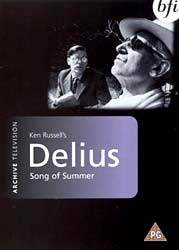 Composer: Delius
Composer: Delius
Works: A Song of Summer
Performers: Max Adrian (Frederick Delius), Maureen Pryor (Jelka Delius), Christopher Gable (Eric Fenby)
Recording: Director’s commentary and biography included in DVD release
Label: British Film Institute
The film Song of Summer, directed by Ken Russell, stands as a poignant exploration of the life and work of Frederick Delius, viewed through the lens of his relationship with Eric Fenby, his amanuensis. Premiering on BBC Television in 1968, this documentary-drama hybrid transcends mere biographical recounting to immerse viewers in the stark and beautiful interplay of music, memory, and mortality. Delius, a composer often overshadowed by his contemporaries, emerges in this film not just as a figure of historical interest, but as a deeply human artist whose late works encapsulate a profound emotional depth, profoundly shaped by his physical decline and the unwavering support of Fenby.
Russell’s direction is characterized by a striking visual narrative that effectively complements Delius’s ethereal music. The cinematography of Dick Bush creates an evocative atmosphere, capturing both the natural beauty of the English landscape and the somber realities of Delius’s existence. The film opens with a delicate tension between light and shadow, a fitting metaphor for Delius’s own life as he grapples with blindness and paralysis. The choice to present the film in black and white enhances this dramatic effect, allowing the viewer to focus on the emotional weight of the performances and the lushness of Delius’s music without distraction.
Max Adrian’s portrayal of Delius is particularly noteworthy; he embodies the composer’s physicality and spirit with remarkable authenticity. Adrian’s vocal inflections, as coached by Fenby, resonate with the nuances of Delius’s character, evoking both fragility and fortitude. The scene in which Delius dictates music to Fenby is masterfully staged, showcasing the tension and urgency of their collaboration. The interpretation choices made in these moments—Adrian’s controlled yet passionate delivery paired with Gable’s attentive responsiveness—serve to highlight the intimate bond that formed between the two men amidst the backdrop of artistic creation.
The film’s sound quality is commendable, facilitating a seamless integration of dialogue and orchestral music. Delius’s A Song of Summer, which serves as the film’s thematic centerpiece, is rendered with a sensitivity that captures its lyrical beauty. The orchestration swells with emotion at pivotal moments, such as when Fenby and Delius triumphantly collaborate on a section of the score, effectively conveying the essence of Delius’s late style—marked by lush harmonies and poignant melodies. Russell’s choice to delay the introduction of Delius’s music until nearly five minutes into the film proves effective, allowing the audience to first engage with the narrative before being enveloped by the composer’s evocative sound world.
Specific musical examples, such as the climactic moment when Jelka sprinkles rose petals over Delius’s body, underscore the film’s thematic richness. Here, the music crescendos in a manner that mirrors the emotional climax of the narrative, achieving a profound synthesis of image and sound. Such moments highlight Russell’s adeptness at using music not merely as a backdrop but as a narrative force that propels the story forward and deepens its emotional resonance.
While the film does take certain liberties with historical accuracy—as noted by Fenby himself—these choices do not detract from its overall impact. The blending of dramatic and documentary elements creates a compelling narrative that is both informative and deeply moving. Russell’s ability to evoke Delius’s world through a combination of factual representation and artistic license reflects a broader understanding of the complexities involved in portraying a composer’s life.
Song of Summer remains a testament to both Delius’s music and the extraordinary dedication of Eric Fenby. It revitalizes interest in a composer whose works deserve greater recognition within the classical canon. The film’s thoughtful direction, compelling performances, and integration of music and imagery make it an indispensable resource for anyone seeking to understand the emotional landscape of Delius’s late works. Its recent DVD release ensures that this remarkable film continues to reach new audiences, reaffirming its status as a classic within the realm of music documentaries.



